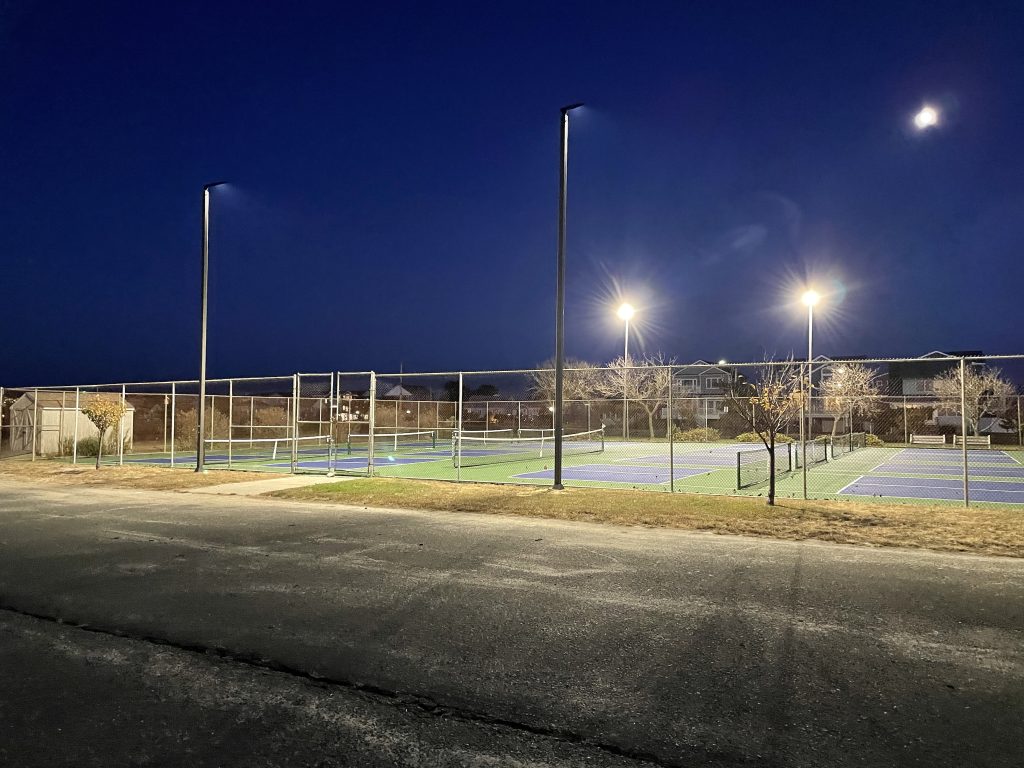There may be no way to please everyone, officials admit, but a more fair and orderly process to manage the borough’s popular pickleball and tennis courts this summer was introduced by ordinance at Monday night’s borough council meeting.
Following a discussion that lasted close to an hour, the council unanimously introduced the ordinance enabling the new system to be put in place. At its basic level, court use will be regulated by rules similar to those that govern other borough recreational properties, such as the basketball courts and baseball fields. The ordinance allows the council to set an annual “recreation badge” fee for unlimited use of the courts, while simultaneously allowing an hourly reservation system for a nominal fee. The fees themselves would be set by the council each year, and are not included in the ordinance itself.
With the popularity of pickleball having exploded over the last several years, what began as a small group of residents who frequently met at the courts to play became something of a victim of its own success. Having grown to between 80 and 100 participants, some residents and officials raised concerns about a single group managing access and scheduling at a taxpayer-owned facility. While the “Pickleball Club,” as it has been dubbed, allows anyone to play, the scheduling has been managed by members of the group, who also collected fees on behalf of the borough. The group also – albeit unintentionally – set the pace of play, which also raised concern among some who said families with children or more casual players could be intimidated by those who take the game very seriously.
Borough Administrator John O. Bennett III drew up the ordinance governing the fee structure, and included language that would allow the club to utilize the courts under a reservation system, blocking out a period of time on certain days, just as many basketball and baseball leagues do at the other parks. As an example, from 8 a.m. to 12 noon, the club would have access to the courts and could schedule players openly as they always have, and modify the match scheduling as they wish. But after their designated time period ends, the general system would kick in, allowing those who do not want to participate alongside the organization to have access to the courts for their own time periods.
“Across the country, pickleball is exploding and a lot of towns are struggling with ways to control it,” said Mayor Walter LaCicero. “This is strictly an introduction – we can modify this if we wish.”
Under the proposed ordinance, pickleball players would pay either the annual recreation fee or a daily fee, since pickleball is not tied to a clock. Those who play tennis, which is timed, would be able to block out specific hours.
The ordinance, effectively a compromise between two systems, saw some initial opposition by club organizers. They held that their own system already allows anyone to play who wishes, and they can manage the courts and keep a rotation running. Under the ordinance, the fees would allow the borough to hire a seasonal employee to manage the courts so residents would not have to take it upon themselves to do so, which has resulted in a few disputes in recent seasons.
“I don’t know if your rules should be dictated to the general public,” said Councilwoman Joanne Filippone, addressing the club members. “The rest of the public has a right to use those courts as they want to use them. The courts belong to the borough, they don’t belong to the pickleball club.”
Hence the compromise, the mayor added.
“If your organization reserves those courts from 8 a.m. to noon every Saturday and Sunday … you can do that as an organization,” he said. “That block is yours – no one who is not playing with you can force you off the courts. You can allow anyone to play with you.”
If the group opposed the ordinance and the council voted it down, the club would not have any block of time set aside to run pickleball play as they wish, and could find themselves waiting in line for whoever blocked out time for themselves or arrived first.
The council introduced the ordinance, which will be subject to a public hearing and a second vote at the next council meeting. While “substantial” changes to the ordinance cannot be made in the interim period, small modifications can be made within the law, and officials said they would be open to more feedback.
The council will meet next on April 24 at 7 p.m. at borough hall.

Advertisement

Ortley Beach & North Beaches
Landmark Ortley Beach Breakfast Spot Looks to Expand

Ortley Beach & North Beaches
‘Temporary’ 70-Foot Cell Tower on Route 35 in Ocean Beach OK’d to Return

Seaside Heights & Seaside Park
Beloved South Seaside Park Restaurant Will Remain Open As Developer Seeks to Demolish Block

Seaside Heights & Seaside Park
In Seaside Heights, A $50M Flagship Building Rises Over the Boulevard in a Famed Location

Police, Fire & Courts
Ocean County Sheriff Establishes Drone Command Center in Seaside Heights Amid New Video






